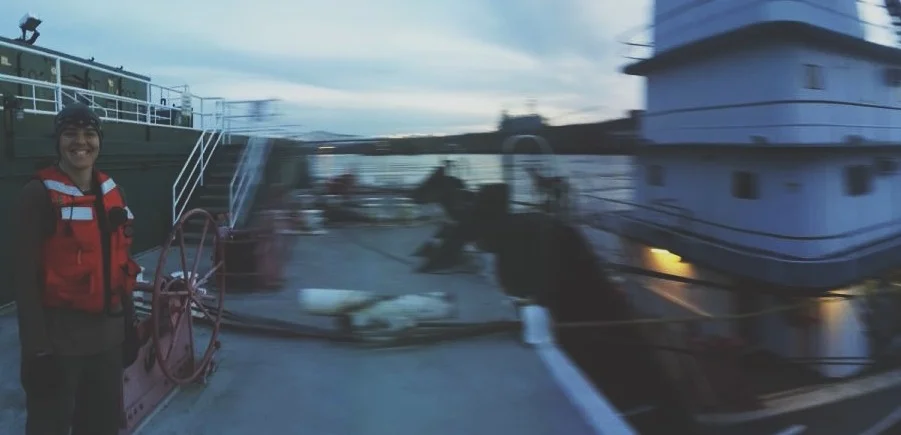The sea is Poseidon, they say. Mazu, protector of seafarers. Ahti, god of fish. Illuyanka, dragon of the ocean. Every place where land meets water the people have built up a mythology, stories piled like sandbags to hold back the raw salt tide.
I'm a white American woman, so in my pantheon the ocean is a cruel ex who used to text me sexy pictures until I forgot, again and again, how bad it was.
I grew up on an island, with the sea licking at the foundations of our house. I wanted to be a fisherman like my parents. I wanted to be a sailor like my brother. I got seasick on damp grass, and I dreamed of landing salmon and trimming sails and squinting knowingly across the trackless deeps. I talked my father into letting me crew for him, the two perfect summers before he retired. I have never been so euphoric or so miserable.
I bought a derelict sailboat with my friends, and we spent two winters living aboard and rebuilding all the systems from scratch. We sailed for a grand total of 10 days, and I came ashore an exhausted wreck.
I worked on a a fishing boat named the Princess, with an Amazonian captain and my oldest friend as crew. We followed king salmon through azure waters in the shadow of a jagged mountain range, and I gloried in the hunt and the blood and the camaraderie while throwing up my toenails on a strict 20 minute schedule.
I broke up with the ocean. I got a degree. I got white-collar jobs. I don’t know whether to blame naivety, the economy, or fate, but I ended up working in a windowless hallway and writing soulless advertising copy about roadside assistance.
Finally I looked around Portland, the city I’d happened to land in. Hey, I thought. There’s a river. Rivers don’t go up and down. They don’t, for the most part, try to murder people with hurricanes and rogue waves and whirlpools. I see some boats out there. They’re big, weird rectangles that look ready to flip over in a light swell. They’re perfect.
I quit my white-collar job. Re-built my resume to play up all that ill-fated sea time. Started making phone calls, visited the Inland Boatman's Union, walked the docks like you do when you’re the new kid in town and you just want to find some raspy old man who will trade pre-season work for a chance to prove yourself.
Turns out the Columbia River is even more of a closed industry than fishing. There aren't actually any docks to walk; they're all blocked by chain link fences and MARSEC warnings. I applied for a job as a marine dispatcher, and the interviewer told me point-blank that it was a miserable job and would never get me out on the boats.
After almost a year, I had yet to even talk to anyone who decked on river tugs. I got in touch with the Workboat Academy in Seattle, thinking that a mate's license might give me more traction. The week I planned to sign my entrance papers, I saw a deckhand position appear on Craigslist.
I came to the interview in rubber boots and told stories about bears and gave everyone very firm handshakes. I was the only woman in a crowd of burly, Copenhagen-dipping dudes, but I passed the physical capacity test (pulling and pushing 200 pounds; lifting 120 and carrying 80) and could talk about rebuilding marine reduction gears, which I guess gave me an edge.
I’ve been a deckhand on tugboats for three years now. I traded the adrenaline and euphoria of seafaring for a good paycheck, a predictable schedule, and 100% less nausea. I think I’ve finally deleted the ocean’s number from my phone, so it can’t wake me up at 2 AM with visions of billowing sails and gleaming fish. I miss the way it smells. I miss its voice, the unpredictable moods, even the damn sea lions. I miss hanging out with its friends. But the river and I are moving in together, and it’s promising me a future that the ocean never could.
